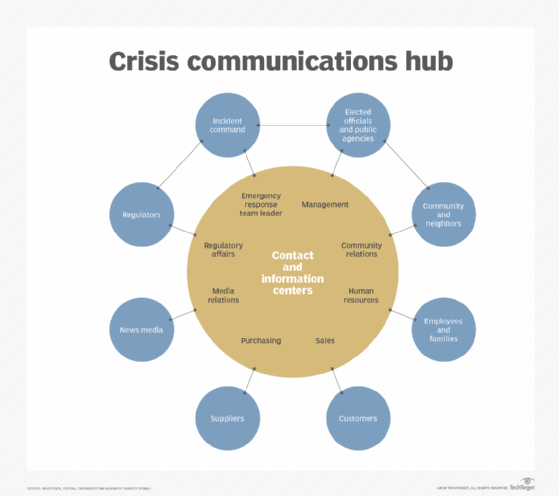
Getty Images
Crisis communications training exercises to implement
A crisis communications team must be prepared to spring into action at a moment's notice. Here are three crisis communications training strategies to ensure a team is ready.
A crisis is never a good time to discover that an organization's crisis communications team is unprepared to meet the challenge it's suddenly facing. Conducting regular training exercises is the best way to ensure that a team is ready to successfully meet the inevitable challenges that await it.
Here are three simple exercises to deploy quickly and inexpensively to hedge against risks of having insufficient crisis communications training.
1. Identify potential threats
Begin the crisis preparation process with "a very short learning bite," said Diane Gayeski, professor of strategic communications at Ithaca College.
"It might be something like a 10- to 15-minute online exercise that could also be done in a 10-minute portion of a face-to-face meeting," she said. Either way, begin the exercise by presenting team members examples of crises faced by similar organizations, and how they managed the situation, both successfully and poorly. Presentations can include videos or live presentations coupled with examples of crises an organization may face, Gayeski said.
Next, ask the group to brainstorm the types of crises their organization could potentially face. Finally, ask team members to quickly place each specific threat, such as a natural disaster, an employee accident or death, a criminal investigation, a product defect or contamination, into specific categories and to rank the severity of each instance.

2. Hold scenario-based planning sessions
Offer team members a safe laboratory environment in which they can demonstrate how they would react when facing various crisis challenges.
"From this, management teams can properly assess and nominate their top picks for their crisis communications team," said Brian Collins, director of BDO USA, a business and financial advisory firm. "This is also a good time for a company to determine whether it has the infrastructure, capacity and capability to handle a sudden crisis, or if outside sourcing is needed."
A lack of knowledge and practice can harm an organization's resilience capacity when faced with diverse crises, said Brittany Haupt, an assistant professor in the Homeland Security and Emergency Preparedness program at the Wilder School at Virginia Commonwealth University. Crises include natural hazards and reputational or operational threats.
"Planning during noncrisis periods provides time to brainstorm strategies, generate a crisis management organizational hierarchy, and determine any resource or logistical needs," she said.
3. Conduct tabletop exercises
Simulate interactive exercises that test an organization's emergency response procedures with key role leaders. This practice enables enterprise management to assess how its crisis communications team will perform during an actual emergency.
"Because a tabletop environment is nonthreatening, exercise participants can calmly rehearse, ask questions and troubleshoot problem areas," said Peter Steinfeld, senior vice president of safety solutions at AlertMedia, an emergency communications provider.
Tabletop exercises help participants better understand their roles during a crisis and provide a safe space to think critically about potential scenarios that could impact normal operations.
"For safety and business continuity leaders, tabletop exercises also provide peace of mind and confidence that key personnel are adequately trained and prepared for critical events, which can drastically improve response times, potentially saving lives and protecting the business from significant losses," Steinfeld said.
Haupt advised practicing with both crisis communications team members and relevant community partners.
"Collaborate with local emergency managers [and] check with the community's comprehensive emergency management plan," Haupt said. "Also check with the organization's legal team to determine any potential liabilities."
Organizations should hold practice exercises at least annually, as the internal and external environment changes.
"Moreover, the organization may face new crises, such as the current global pandemic, that will require new and innovative crisis communication strategies," Haupt said.







